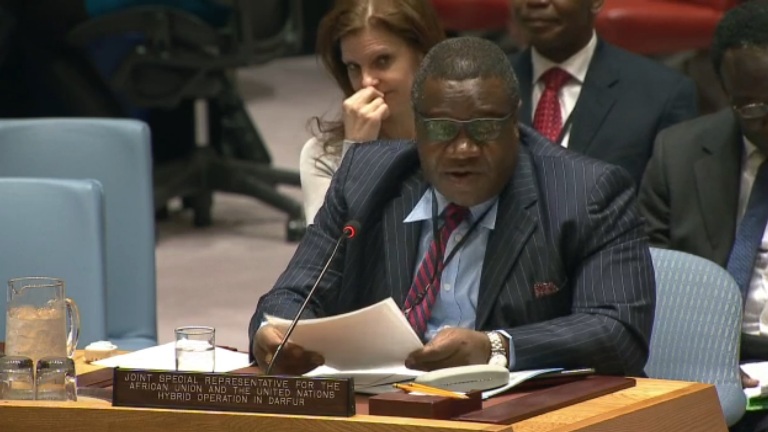Darfur of today is different from 2003 : UNAMID head

April 4, 2017 (WASHINGTON) – The newly appointed head of Darfur hybrid mission (UNAMID) Jeremiah N. Mamabolo Tuesday told the UN Security Council that security situation in the western Sudan region has changed and the fighting has by far diminished.
“The Darfur of today is a very different place from what this region was in 2003 when the armed conflict began, and from that of a year ago,” Mamabolo said.
He added that the fighting between the government and holdout Darfur rebel groups has “considerably diminished”.
The head of the peacekeeping mission said the unilateral ceasefire by the government, the Sudan Liberation Movement of Minni Minnawi (SLA/MM) and Justice and Equality Movement (JEM/Gibril) was extended by another six months in January 2017.
Based on this conclusion, the joint envoy said discussions on UNAMID exit strategy from Darfur continue to take place and the upcoming meeting will be held in Khartoum and at the UNAMID headquarters in El-Fasher during the period of 5-17 March.
“In view of the current circumstances in Darfur, a pragmatic reconfiguration of UNAMID will become necessary and the AU and UN will have to focus on how best that could be done without compromising the gains thus far made,” he said.
Nonetheless, the UNAMID chief said banditry and criminality continue to be widespread despite the end of clashes with rebel groups.
“The proliferation of small arms and light weapons feed those negative phenomena, as well as inter-communal violence usually triggered by competition mostly over land, water, grazing and mineral resources”.
The UNAMID chief pointed that the Sudan Liberation Movement of Abdel Wahid al-Nur (SLM-AW) has been weakened and the government has retaken the control of areas previously held by the rebel group.
The SLM-AW fighters who had controlled some mountainous areas of Jebel Marra remained far from the fighting between the government army and the other armed groups particularly JEM and SLM-MM.
However, in April 2016, Sudanese government declared Jebel Marra free of rebels after a large-scale military campaign launched in January of the same year. But the Sudanese army continued for several months to carry out air attacks in the area in order to clear the area from the rebel pockets.
The South African diplomat regretted that the rebel group continues to refuse to join the regional and international efforts for peace in Sudan.
“SLA/AW continues to refuse to join the peace process and seems to want to continue to fight,” said Mamabolo, adding “We would like to appeal to this Council and those with influence and leverage on him to persuade him to recognize the importance of a political settlement and desist from bringing more suffering to the very people that he professes to represent.”
Last year, the U.S. Special Envoy for the two Sudans openly criticised the group refusal to join the peace talks stressing that “peace in Sudan must not be held hostage to Abdul Wahid’s refusal to engage”.
Also, Russian Ambassador to the United Nations recently called to impose sanctions on the rebel leader.
Commenting on the report of the UNMAID chief, Ukrainian and Sweden diplomats called on the SLM-AW to refrain from military action and to join the peace process.
The joint representative praised the improved cooperation of the Sudanese government with the UNAMID and the left of restrictions in Darfur.
However, the mentioned that “delays still remain in the clearance of UNAMID goods and equipment remain a concern as some shipments have been pending since 2015 and have accumulated significant demurrages”.
(ST)
